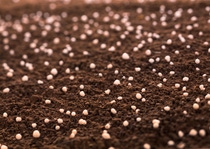Media
BASF and Yuntianhua successfully verify and register greenhouse gas emissions reductions from the use of stabilized urea fertilizer
- Use of urease inhibitor Limus® on urea fertilizer led to reduction of over 46,000 metric tons of CO2 equivalent emissions
- Emission reductions were independently verified according to international carbon accounting standards
- Successful first pilot leading to continued emissions reduction monitoring cycles with Yuntianhua and expansion opportunities globally
In 2023, BASF and Yunnan Yuntianhua Co., Ltd., a China-based fertilizer manufacturer, launched a pilot project in China to verify the reduction of CO2 equivalent emissions (CO2e) from the use of Yuntianhua’s stabilized urea fertilizer containing BASF's urease inhibitor Limus®. The pilot verified that Yuntianhua reduced roughly 46,584 tons of CO2e emissions by using Limus-treated fertilizer versus untreated fertilizer. This estimate is based on Yuntianhua’s sales of Limus-stabilized urea during the pilot. These results not only contribute to climate-smart agriculture initiatives in China, but they also demonstrate successful project implementation, enabling expansion opportunities globally.
Around 15 percent of nitrogen in urea fertilizer is lost to the atmosphere as ammonia1, causing a deterioration in air quality and biodiversity. Additionally, applied nitrogen released as nitrous oxide can enter the atmosphere as greenhouse gas. Along with the detrimental environmental effects of nitrogen loss, farmers suffer economic and yield quality losses as less nitrogen is available to crops when they need it most. The successful project results reaffirm that applying Limus urease inhibitor on urea fertilizer stabilizes the urea, and this Limus-treated urea emits less ammonia and nitrous oxide than standard, non-treated fertilizers. As part of their climate-smart agriculture initiatives, Yuntianhua hosts field trial demonstrations for farmers, distributors, and retailers showcasing these benefits of stabilized urea.
The project has been verified by an independent auditor according to the international ISO 14064 standard. The project is listed in the GHG CleanProjects® Registry, a public database of projects that intend to reduce or remove greenhouse gases using the ISO 14064 standard for greenhouse gas inventory and reporting. BASF also collaborated with First Climate, a leading global provider of carbon management and sustainability solutions, to develop the pilot project in China and monitor the project’s outcomes.
“Together with Yuntianhua, we not only proved the feasibility of implementing this climate-smart agriculture initiative to verify emissions reductions but also its importance amidst global climate change, as agriculture is in a unique position to address it,” said Markus Schmid, Nitrogen Management business lead at BASF. “Now the second monitoring cycle is underway and can help set the stage to expand to partners in the food value chain.”
“Limus is a uniquely innovative product, proven to both reduce urea application rate, and improve efficiency and crop yield while significantly decreasing nitrogen loss to the environment,” said Mr. Chen Jin, General Manager of Yunnan Yuntianhua Agricultural Material Chain Co., Ltd. “It is the triple win solution for the fertilizer industry, farmer, and society. By continuing this climate-smart agriculture initiative with BASF, we contribute to our strategic goals of modernizing agriculture and finding innovative solutions to address sustainable agriculture.”
Based on learnings from the pilot project, including the creation of a robust and scalable monitoring procedure, BASF is conducting a second monitoring cycle with Yuntianhua to once again verify the reduction of CO2e of Limus-treated fertilizer from the 2024 calendar year. BASF is also exploring similar opportunities with fertilizer manufacturers in other countries globally. The aim is to enable upstream fertilizer producers in the agricultural value chain to participate in climate-smart agriculture initiatives, obtain verified emissions reductions from the use of stabilized nitrogen fertilizers, and reduce their carbon footprints.
1Pan et al. 2016: Ammonia volatilization from synthetic fertilizers and its mitigation strategies: A global synthesis, Agriculture, Ecosystems and Environment 232, 283–289
About BASF’s Agricultural Solutions division
Everything we do, we do for the love of farming. Farming is fundamental to provide enough healthy and affordable food for a rapidly growing population, while reducing environmental impacts. That’s why we are working with partners and experts to integrate sustainability criteria into all business decisions. With €919 million in 2024, we invest in a strong R&D pipeline, combining innovative thinking with practical action in the field. Our solutions are purpose-designed for different crop systems. Connecting seeds and traits, crop protection products, digital tools and sustainability approaches, to help deliver the best possible outcomes for farmers, growers and our other stakeholders along the value chain. With teams in the lab, field, office and in production, we do everything in our power to build a sustainable future for agriculture. In 2024, our division generated sales of €9.8 billion. For more information, please visit BASF Agricultural Solutions | Global or our social media channels.
About BASF
At BASF, we create chemistry for a sustainable future. Our ambition: We want to be the preferred chemical company to enable our customers’ green transformation. We combine economic success with environmental protection and social responsibility. Around 112,000 employees in the BASF Group contribute to the success of our customers in nearly all sectors and almost every country in the world. Our portfolio comprises, as core businesses, the segments Chemicals, Materials, Industrial Solutions, and Nutrition & Care; our standalone businesses are bundled in the segments Surface Technologies and Agricultural Solutions. BASF generated sales of €65.3 billion in 2024. BASF shares are traded on the stock exchange in Frankfurt (BAS) and as American Depositary Receipts (BASFY) in the United States. Further information at www.basf.com.
P-25-054

